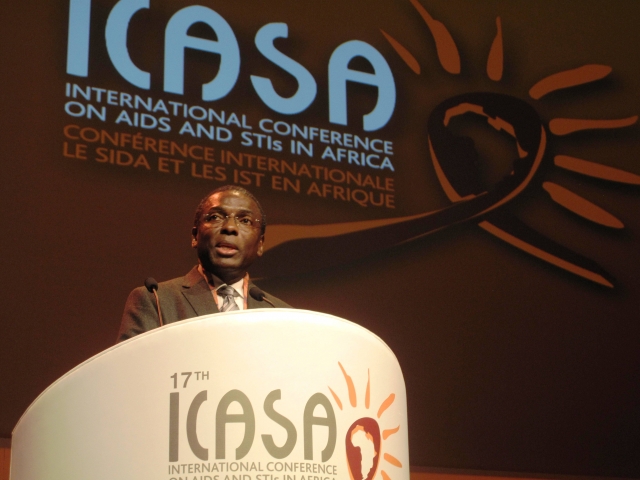Stronger national response is needed to continue the fight against HIV/AIDs, says Dr Sambo

Cape Town/Brazzaville, 11 December 2013 -- The World Health Organization Regional Director for Africa, Dr Luis Sambo has called for stronger national response to the fight against HIV/AIDS. He made the call while addressing delegates at the 17th International Conference on AIDS and Sexually Transmitted Infections in Africa (ICASA) which is taking place in Cape Town, South Africa.
Speaking under the theme: “World Health Organization’s New HIV Treatment and Prevention Guidelines and What they Mean for Africa,” the Regional Director urged African Governments to continue creating an enabling environment for inclusiveness and universal access to fight against HIV/AIDS. He also highlighted the need for functional national multi-sectoral coordinating committees for HIV/AIDS, governance and forging appropriate domestic and external partnerships to mobilize, allocate and efficiently use resources to fight HIV/AIDS.
The Regional Director reminded the audience of the importance of HIV/AIDS prevention. “Primary prevention through the ABC approach of “abstinence, be faithful, and use a condom” is still the most simple and affordable way of preventing HIV infection,” he said.
Dr Sambo expressed concern that more than half of the people living with HIV in the African Region do not know their HIV status and stressed the need to seriously address the problem of testing late for HIV, patients dropping out of ART and dependence on external funding.
He called on everyone both infected and not infected to be collectively accountable in the fight against HIV/AIDS. “More attention needs to be paid to addressing the needs of key populations at risk of HIV infection,” he added.
Referring to the implications of the new WHO HIV Treatment and Prevention Guidelines for health care delivery systems in Africa, Dr Sambo noted that, there is increasing scientific evidence that early initiation of antiretroviral therapy (ART) as promoted by the guidelines, has the potential to reduce HIV-related illness, deaths and reduction in the spread of the disease.
Based on the current status of the epidemic, the total number of individuals eligible for ART is estimated to increase by 53% from 12.4 million to 19 million. This increase will require further investments in health systems infrastructure in order to accommodate the additional number of people under ART. He stressed the critical need for more health workers, strengthened laboratory capacity, efficient procurement of medicines and commodities, along with health information systems and statistical services.
The five day event which began on 7 December is attended by delegates comprising scientists, policy makers, activists, people living with HIV (PLHIV), government leaders among others.
____________________________________
For more information, please contact:
Dr Emil Asamoah-Odei: +4724139910, Email: motarim [at] afro.who.int
Collins Boakye-Agyemang: +4724139420, E-mail: Boakyec [at] afro.who.int
Eugene Tebogo Mahlehla: +27 82 308 8853, Email: mahlehlaeu [at] who.int
Tunga Namjilsuren: +41 79 203 3176, Email: namjilsurent [at] who.int



